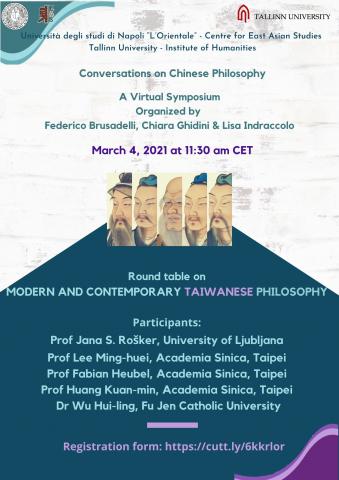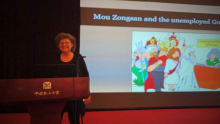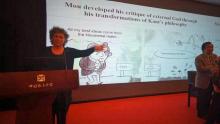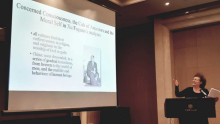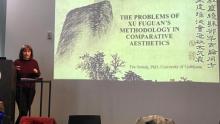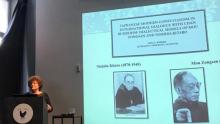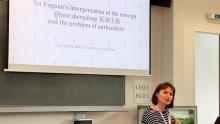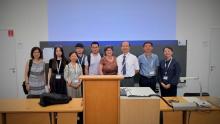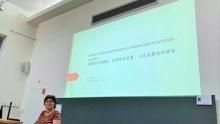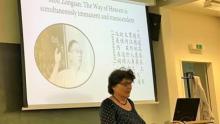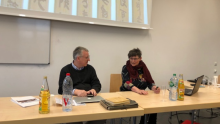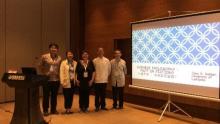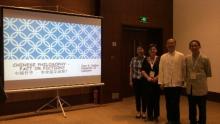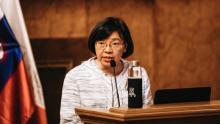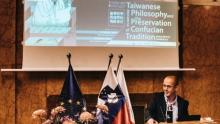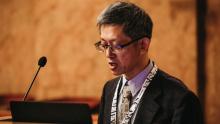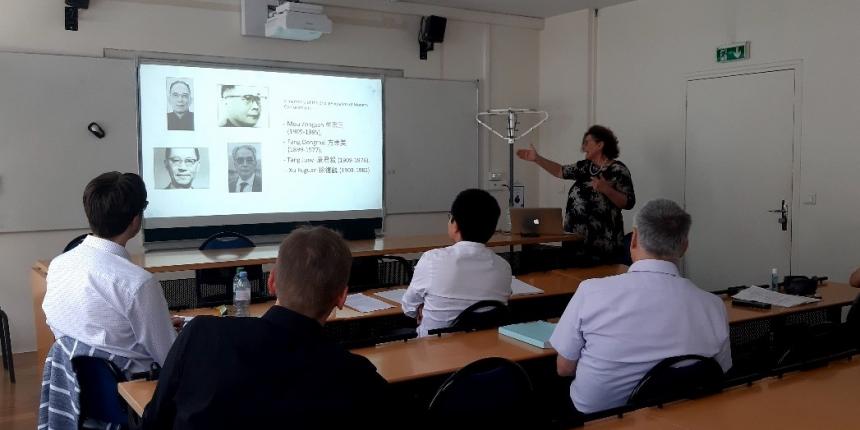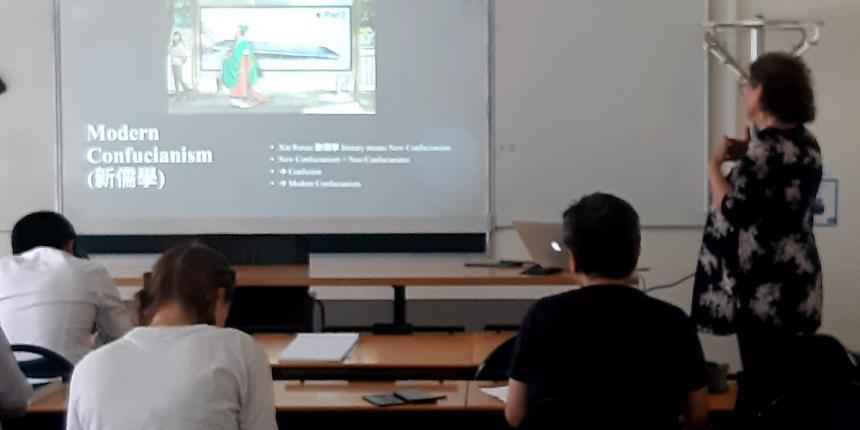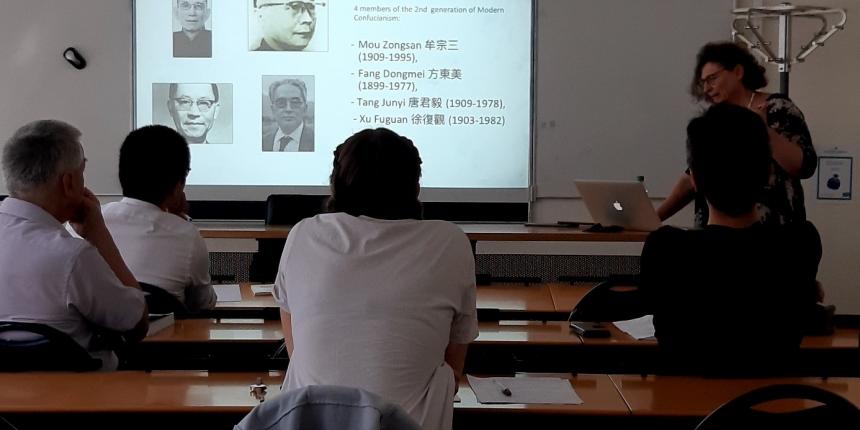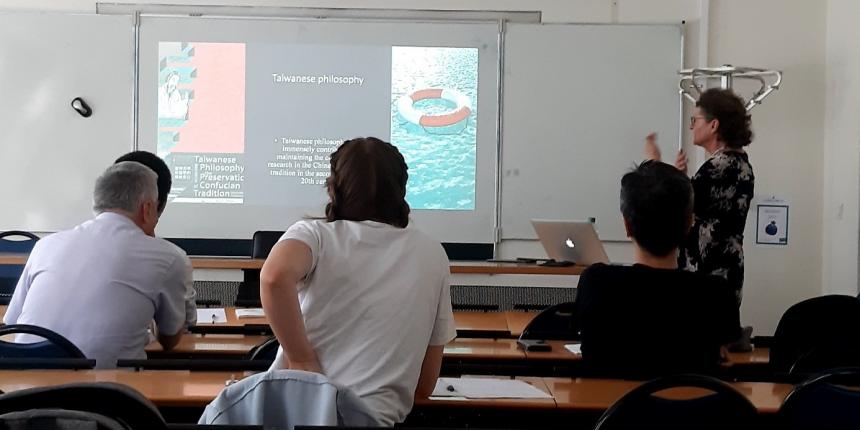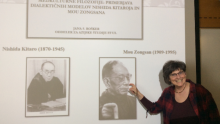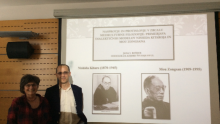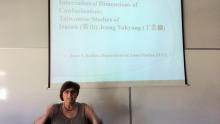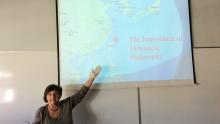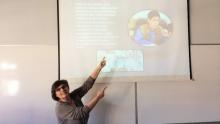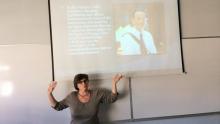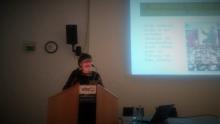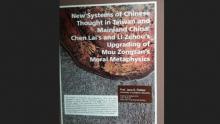

Modern and Contemporary Taiwanese Philosophy // 臺灣現代與當代哲學
Chiang Ching-kuo Foundation Research Project RG004-U-17
Funded by:
Chiang Ching-kuo Foundation for International Scholarly Exchange
13F, 65 Tun Hua South Road, Section 2, Taipei, Taiwan 106 ROC
Tel: 886-2-2704-5333
Fax: 886-2-2701-6762
E-mail: cckf@ms1.hinet.net
Project Director:
prof. Jana S. Rošker, University of Ljubljana
羅亞娜教授, 盧布爾雅那大學
Project Co-director:
prof. Lee Ming-Huei, Academia Sinica, Taiwan
李明輝教授, 台灣中央研究院
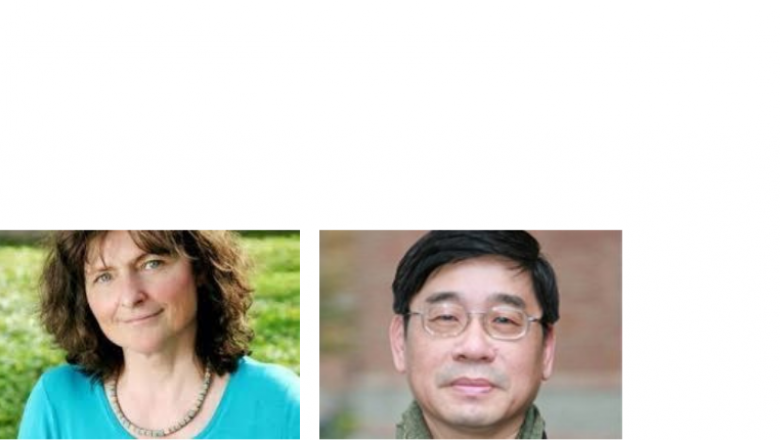
Project Director: prof. Jana S. Rošker, University of Ljubljana 羅亞娜教授, 盧布爾雅那大學 and Project Co-director: prof. Lee Ming-Huei, Academia Sinica, Taiwan 李明輝教授, 台灣中央研究院
List of Project Collaborators:
- Taiwan: Professor Lee Ming Huei (project co-director); Interviews with ca 15 other Taiwanese scholars
- Slovenia: Professor Jana S. Rošker, Professor Vampelj Suahdolnik Nataša, Téa Sernelj Ph.D., Barbara Dolenc and Jan Vrhovski
- Croatia: Ass. Professor Ivana Buljan
- Bosnia: Professor Nevad Kahteran
- Slovakia: Professor Jana Benička
- Austria: Professor Agnes Schick Chen
External Collaboration Partners:
- prof. Geir Sigurðsson, Iceland University, Reykjavik, Iceland,
- prof. Bart Dessein, Ghent University, Belgium
Supporting assistance - extended list of project members:
- Byoung Yoong Kang, Ph.D.
- Maja Kosec, Ph.D. student
- Marko Ogrizek, Ph.D. student
- Jasna Bavec, MA
Title: Modern and Contemporary Taiwanese Philosophy - 臺灣現代與當代哲學
Funded by: Chiang Ching-kuo Foundation for International Scholarly Exchange
File number: RG004-U-17
Duration: from 07/2018 to 07/2021 (total 3 years)
Matching funds: Office for Scientific research at Ljubljana University, Slovene National Research Agency (Ministry for Science and High education) and Taiwan Studies Centre at Ljubljana University.
Project abstract:
台灣現代與當代哲學 計畫摘要 (中文): 本計畫是向歐洲學術界系統地介紹、推廣台灣現代與當代哲學家的研究成果與傑出貢獻為主要目的。由於中歐洲 (特別是中歐) 區域,目前對於台灣文化與學術成就不夠熟悉,因此本計畫成員的引介將特別聚焦於該區域。 台灣的哲學,在東亞和現今世界具有相當大之重要性,其主要理由有兩方面: - 首先,我們發現在二十世紀下半葉期間,他們的貢獻在於保存了中國的傳統思想; - 其次,他們發展出獨特創新的哲學進路與系統,因而深刻地影響了整個東亞地區的理論論述。 現在台灣的哲學潮流,主要是發展二十世紀下半葉的哲學,該時期在大陸中共的哲學理論發展,受到馬克思主義思想意涵的極大限制。因此,幾十年來,台灣哲學代表著提升傳統思想現代化,並與西方思想結合的唯一動力。是故,他們經由古典中國思想而對傳統研究的工作,可很快地廣泛傳播於其他大多數亞州學術社群,如日本與南韓。 台灣的哲學家們努力闡述詳細的概念和價值系統,一方面,以適於解決現代台灣社會和政治的問題。另一方面,也關照現代全球化的問題。因此,此一研究計畫不會只限定在台灣哲學家們哲學的進路、觀念和方法上,同時也會更深入的涉及台灣哲學中特有的政治、社會和意識型態背景等部分。此外,本計畫也將研究台灣現代性思維方式的基礎間之內在聯繫,本計畫的目的,也在於廣泛關注台灣對於大陸與其他東亞社會非直接感知的影響層面。 關鍵詞: 台灣現代與當代哲學, 台灣與中歐地區的關係, 中國哲學的方法論, 理論革新。
Project Abstract (English):
The main goal of the proposed project is to systematically introduce to the European (especially Central European) academic public and spread the most important achievements of modern and contemporary Taiwanese philosophers, along with their contributions in the field of contemporary philosophical theory. There are two main reasons for the immense importance of Taiwanese philosophy for East Asia and the contemporary academic world: 1. First, they can be found in its contributions to the preservation of traditional Chinese thought during the latter half of the 20th century. 2. Secondly, its development of specific innovative philosophical approaches and systems have been since this period profoundly influencing the theoretical discourses in the entire East Asian region. Since the Western academic world is to a large extent unaware of both above-mentioned facts, the aim of our project is to raise awareness about the importance of these contributions in Europe, especially in the regions of Central Europe. These regions have been hitherto namely completely ignorant about the vivid and important role Taiwanese scholars were playing in the East Asian academic world at the threshold of the third millennia.
Therefore, one of the central project aims is also to strengthen and develop the cultural, academic, and educational exchange between the two areas. The philosophical currents in modern Taiwan were mainly developed during the second half of the 20th Century, in which the philosophical theory in mainland China was largely limited to the Sinification of Marxist thought. Hence, for many decades, Taiwanese philosophy was the only driving force behind the development, modernization, and upgrading of traditional Chinese thought and its syntheses with Western philosophy. Therefore, it soon also gained a wide spread popularity in most of the other East Asian societies that were traditionally influenced by classical Chinese thought, such as Japan and South Korea. Besides investigating Taiwanese influences upon these East Asian regions, the project also aims to focus upon the broad and important impact of Taiwanese philosophy to the mainland Chinese academic world. Additionally, the proposed project will also explore Taiwanese developments and innovations regarding the specific concepts and methods for investigating Chinese philosophy. At the same time, however, it will also focus upon research in the foundations of the specific Taiwanese approaches to the theoretical elaboration of East Asian modernization. In this context, it will also investigate new approaches in the Chinese philosophical methodology. The collaborating researchers will explore all these achievements and innovations systematically and introduce them to the European (especially Central European) academic world. Keywords: Modern and contemporary Taiwanese philosophy, Taiwan’s relations with Central Europe, Methodology of Chinese philosophy, Theoretical Innovations.
Cooperation History
The current CCKF project on Modern and Contemporary Taiwanese Philosophy has been established on the basis of previous collaborations between the department of Asian Studies at the Ljubljana University and numerous Taiwanese scholars, universities and research institutions.
Publications
The publications of the current project look back upon a rich historical background. In the past decade, the project leader Jana S. Rošker, who is also the chief editor of the academic journal Asian Studies, which is published by the Faculty of Arts of the Ljubljana University, has published two special issues of this journal that were dedicated to Taiwanese culture and philosophy.
The first one was entitled Special Edition on Taiwan and published in December 2011. This issue was edited by Professor Saša Istenič, who is the current Director of the Taaiwan study center of our department, and also the current CCKF project collaborator. This special issue can be found here: DOI: https://doi.org/10.4312/as.2011.-15.2
The guest editor’s foreword can be found here: https://revije.ff.uni-lj.si/as/article/view/2876/2865
The second one was edited by the chief editor of the journal and the current project leader, Professor Jana S. Rošker. It was entitled Recent Contributions from Taiwanese Academic Circles: Methodology, Philosophy, Literature and History and published in September 2012. The entire journal can be found here: DOI: https://doi.org/10.4312/as.2012.-16.1
The editor’s foreword can be found here: https://revije.ff.uni-lj.si/as/article/view/2296/2001
Among others, the current CCKF research grant project Modern and Contemporary Taiwanese philosophy (RG004-U-17) also represents a development, an upgrading and a substantial deepening of the Professor Jana Rošker’s previous CCKF research grant project Taiwanese Modern Confucians and their Philosophical Contribution to Asian Modernization (RG003-U-11) which was successfully and most productively carried out by the project leader and her collaborative team from 2012-2015, in the framework of which they have published a great number of research articles, book chapters, book collections and authored books on the research topic. All publications that were results of this research grant project can be found here.
All significant publications in which the support of the CCKF Foundation was acknowledged, were also (as initially agreed) sent to the foundation.
The most significant outcomes of the previous project are visible in the following two monographs and two edited anthologies:
I. Monographs, written by the project leader Jana S. Rošker
- 1. ROŠKER, Jana S. 2013. The Subject’s new Clothes – Intellectual Foundations of Modernity in the Works of the 2nd Generation of Modern Confucianism. (In Slovene: Subjektova nova oblačila - idejne osnove modernizacije v delih druge generacije modernega konfucijanstva). 1. Edition. Ljubljana: Znanstvena založba Filozofske fakultete, ISBN 978-961-237-582-9.
- 2. ROŠKER, Jana S. 2016. The Rebirth of the Moral Self - The Second Generation of Modern Confucians and their Modernization Discourses. Hong Kong: Chinese University Press & University of Hawaii’ Press. ISBN 978-962-996-688-1.
II. Edited monographs
- ROŠKER, Jana S. (Ed.), VAMPELJ SUHADOLNIK, Nataša (Ed.). Modernisation of Chinese Culture: Continuity and Change. Newcastle upon Tyne: Cambridge Scholars Publishing, 2013, str. 11-32. ISBN 1-4438-4593-052767330.
- ROŠKER Jana S. (ed.), VISOČNIK, Nataša (ed.). 2015. Contemporary East Asia and the Confucian Revival. Newcastle upon Tyne: Cambridge Scholars Publishing. ISBN 978-1-4438-8103-6. ISBN 1-4438-8103-1.
Guest lectures and conferences:
During the past decade, the project leader and the project team have delivered altogether 18 guest lectures at various Taiwanese universities and research institutions. They have also attended 7 different academic conferences in Taiwan.
On the other side, they have organized several guest lectures for various Taiwanese professors and scholars of Chinese (Taiwanese) philosophy. 5 Taiwanese scholars were invited to attend various conferences on Taiwanese humanities and social studies in Ljubljana. During the past 5 years, the ARRS research program group Asian Languages and Cultures (chief Jana S. Rošker) which operates at the department of Asian studies, has organized and funded 4 guest lectures series, delivered by professor Lee Ming-Huei from the Academia Sinica, who is the co-director of the past and present research grant project. The first one (2012) was organized at Ljubljana University, Slovenia. The second one (2013) was organized at the Vienna University, Austria and the Commenius University in Bratislava, Slovak Republic. The third and the fourth ones were perhaps the most important ones, because they represented the first academic exchange in the field of humanities between Taiwan and the Balkan region. The first of these two Balkan series (2014) was organized in the University of Zagreb. It paved the way at the Zagreb University for the next series of lectures in the area of Taiwan studies that were regularly delivered during the two entire academic years from 2015 until 2018. The last series of lectures was conducted after the first research grant project and has been organized at the University of Banja Luka and the University of Sarajevo (both in Bosnia). They were especially important, because the pro9ject co-director Lee Ming-Huei has hence become the first Taiwanese scholar who has ever delivered a lecture in Bosnia, a country at the heart of the Balkan region.
Sernelj, Téa. 2019. "Modern Confucian Objection against Communism in China––the Unique Case of Xu Fuguan." Asian Studies, 7(1): 99-113.In January 2019, the research project team member Téa Sernelj has published a research paper on the Taiwanese philosopher Xu Fuguan in the renewed journal Asian Studies (impact factor SJR 0,21), The articles of this journal are indexed/reviewed in the following databases/resources:
Téa Sernelj’s article “Modern Confucian Objection against Communism in China––the Unique Case of Xu Fuguan” investigates the political views of Xu Fuguan, who belongs to the most prominent representatives of the so-called second generation of Modern Confucianism. It reveals his unique position within this intellectual movement. Even though all other adherents of Modern Confucianism were focused upon metaphysics and ontology rather than political theory, Xu believed that these lines of thought could not contribute enough to solving the various urgent social and political problems of modern China. In this regard, the article focuses upon a critical analysis of Xu’s critique of the Chinese Communist Party. The author presents and evaluates his critique mainly with regard to his search for a resolution of the problematic and chaotic political and social situation of China during the first half of the 20th century. In conclusion, the author provides a critical evaluation of Xu’s social democratic thought and particularly of his attitude towards the Chinese Communist Party. The author has acknowledged the support of the Chiang Ch’ing-Kuo Foundation on the first page of the article. Link to the article in here. |
2. Rošker, Jana S. 2019. “Modernization of Confucian Ontology in Taiwan and Mainland China.” Asian Philosophy, 29(2): 1-17.In May 2019, the project director Jana S. Rošker has published an article entitled Modernization of Confucian Ontology in Taiwan and Mainland China in the prestigious philosophical journal Asian Philosophy. Here is some basic information - to cite this article: Jana S. Rošker (2019): Modernization of Confucian ontology in Taiwan and mainland China, Asian Philosophy, DOI: 10.1080/09552367.2019.1622195 - to link to this article: https://doi.org/10.1080/09552367.2019.1622195 The project director has acknowledged the support of the Chiang Ch’ing-Kuo Foundation at the end of the text, under “Acknowledgements” and under “Funding” Abstract: The present paper compares three models of modernized Confucian Ontology. The philosophers under debate belong to the most important, well-known and influential theoreticians in modern Taiwan and mainland China respectively. Through a contrastive analysis, the paper aims to critically introduce three alternative models of ontology, which have been developed from the Chinese philosophical tradition by the most well-known Taiwanese philosopher Mou Zongsan and by two most influential mainland Chinese theoreticians, Li Zehou and Chen Lai respectively. In this paper, I will analyze and critically introduce Li Zehou’s and Chen Lai’s respective critiques of Mou Zongsan’s basic assumptions that have been reflected in his methodological paradigms, while also exposing some major differences within their own lines of thought. Link to the article: here. |
3. Kang, Byoung Yoong. 2019. Taiwanese Philosophy in Korea: A comprehensive list of research papers on Taiwanese philosophy published in Korea between 1994 and 2018. Ljubljana: Scientific Press, Faculty of Arts, University of LjubljanaIn June 2019, the research project team member Kang Byoung Yoong has published an independent booklet entitled Taiwanese Philosophy in Korea: A comprehensive list of research papers on Taiwanese philosophy published in Korea between 1994 and 2018 . The book (ISBN 978-961-06-0213-2, CIP - 1(529)(082)) was published and printed by the Scientific Press of the Faculty of Arts, Ljubljana University. Short description: This booklet comprises a comprehensive list of research papers on Taiwanese philosophy published in Korea between 1994 and 2018. The research material, which is rich and comprehensive, represents a valuable collection of material that could be accessed for this research topic in South Korea. It was mainly collected by means of a comprehensive review and survey of several of the most important Korean databases that are available for researchers at the University of Ljubljana in Slovenia. The present research report will enhance and facilitate further Slovenian and international investigations on the impact of Taiwanese philosophy on the wider East Asian area. The author has acknowledged the support of the Chiang Ch’ing-Kuo Foundation on the first page of the book. Link to the book: here |
4. Rošker, Jana S. 2019. “Philosophy in Taiwan: the Continuation of Tradition and the Creation of New Theoretical Paradigms.” Asian Studies, 7(2): 247-268.In June 2019, the research project director Jana S. Rošker has published a research paper on Taiwanese philosophy in the journal Asian Studies (impact factor SJR 0,21). The article is written in Slovene language and its original title is: “Filozofija na Tajvanu: nadaljevanje tradicije ali ustvarjanje novih teoretskih paradigem?” The author has acknowledged the support of the Chiang Ch’ing-Kuo Foundation on the first page of the article. Abstract Taiwanese philosophers are playing a rather prominent role in the context of preserving the Chinese ideational tradition, even though their significance in this context is still widely unknown. The present article is thus focused upon the critical introduction of their work, and its positioning into the context of the political, economic and intellectual conditions of the second half of the 20th century. The role of the Taiwanese philosophy was especially important precisely in the period which begun in 1949 and lasted until the end of the century. In these five decades, the philosophical production on the mainland was mostly dominated by censorship, and the prevailing regulations of the Communist Party’s policies mainly demanded that researchers working in philosophy stayed in the field of the sinization of Marxism, whereby investigating the Chinese intellectual tradition was not so much in favour. The article clearly exposes the reasons for and significance of the preservation of continued research into Chinese ideational history in Taiwan, and points out that without this extraordinarily constructive role of the Taiwanese philosophers, these studies would have suffered immense damage. The author also shows that the work carried out by the Taiwanese philosophers was not merely important in respect of preserving the continuation of Chinese philosophical research, but also because they have at the same time created numerous innovative methodological and theoretical concepts that have fundamentally enriched the recent history of investigating and developing Chinese philosophy. In this regard, the author exposes and critically analyses some of the central philosophical concepts of Mou Zongsan, who is among the most important representatives of modern Taiwanese philosophy. Keywords: Taiwanese philosophy, research in the Chinese intellectual tradition, Chinese philosophy, Confucianism, new concepts, new methodologies Link to the article: here |
5. Rošker, Jana S. ed. 2019. Philosophy in Taiwan – Characteristics, Function and Importance. Ljubljana: Znanstvena založbaIn June 2019, the research project director Jana S. Rošker (chief editor) and the project team member Jasna Bavec (technical editor) have published a book on Taiwanese philosophy. The book is written in Slovene language and its original title is: Filozofija na Tajvanu: značilnosti, vloga in pomen Summary: The present book is related to an unusual chapter of Chinese intellectual history. It is a collection of Slovene translations of modern philosophy, which was originally written in Chinese, and mainly deals with traditional Chinese thought. Yet this philosophy did not originate in mainland China, and thus in some supposedly logical “centre” of Chinese culture, but on its alleged “periphery”, namely on the beautiful island of Taiwan. The main reason for compiling this book is to show to Slovenian readers that Taiwanese philosophers have played an important role in the development of modern Chinese philosophy, and especially in the second half of the 20th century. The editor, Jana S. Rošker, has also authored two contribution in this volume, namely the Introduction (p. 7-13), and chapter 2 entitled The Significance of Modern and Contemporary Taiwanese Philosophy for the Preservation of the Chinese Ideational Tradition (p. 27-44). Same as the rest of the book, these two contributions were also published in Slovene language. Link to the PDF version of the book: here. |
|
6. Rošker, Jana S. 2019. "A philosophical relation between Taiwan and Japan: models of dialectical thought in Mou Zongsan’s and Nishida Kitaro’s theories." Asian Philosophy, 29(4): 1-18.https://doi.org/10.1080/09552367.2019.1699260 In December 2019, the research project director Jana S. Rošker has published a research paper on Taiwanese philosophy in English language in the renewed academic journal Asian Philosophy. The paper is entitled A philosophical relation between Taiwan and Japan: models of dialectical thought in Mou Zongsan’s and Nishida Kitaro’s theories. The author has acknowledged the support of the Chiang Ch’ing-Kuo Foundation on the first page of the article, as well as in the end of the paper, under the section Funding. Abstract: The article opens with a discussion of recent theoretical and methodological innovations in the field of comparative philosophy. In this regard, I propose and explain a new possible method of contrasting particular aspects of divergent philosophical texts or discourses and denote it as a ‘philosophy of sublation’. Then, the paper provides a concrete example for such a post-comparative method of reasoning, I will try to apply a ‘sublation philosophy’ approach for a reinterpretation of certain aspects of the complex philosophical intersections between modern Japanese and Chinese philosophies through the lens of a contrastive analysis of Nishida Kitarō’s and Mou Zongsan’s dialectical thought. In this way, I hope to shed some new light upon some general questions regarding different models of dialectics. Keywords: Taiwanese philosophy, modern Japan philosophy, comparison between Taiwanese and Japanese philosophy, Mou Zongsan, Nishida Kitaro, dialectics, philosophy of sublation Full article can be accesed here. PDF version here. |
7. Book (Scientific Monograph): Rošker, Jana S. 2020. IN THE SHADOW OF GREAT MASTERS: TWO CONTEMPORARY TAIWANESE FEMALE PHILOSOPHERS AND THE QUESTION OF WOMEN IN CHINESE PHILOSOPHY.(Original title in Slovene: V senci vélikih mojstrov: vprašanje žensk v kitajski filozofiji na primeru dveh sodobnih tajvanskih filozofinj).ISBN 978-961-06-0303-0. Book in e-bookstore. The book has been published in April 2020 at the Scientific Press of the Ljubljana University, Faculty of Arts. It is written in Slovene language but is currently being translated into English language. Summary This book on female Chinese philosophers has been on my mind for many years. But its actual writing was always put on hold and pushed into the background of my other research work. Other topics always seemed more important, more urgent and more topical. Being a female expert in Chinese philosophy myself, this belittling attitude regarding the importance of female philosophers is somehow ironic, and it is certainly symptomatic of the way the topic treated in this work has usually been approached. But finally, I made it, and I wrote the book through the lens of two problems. Both are linked to a philosophical work that is – entirely unjustifiably – pushed to the very margins of dominant discourses. Firstly, this book deals with problems pertaining to the question of gender discrimination in the field of general philosophy, and particularly in the field of Chinese philosophy. It deals with this discrimination on many different levels, starting with the multifarious expressions of misogyny in the very contents and structures of these discourses, and trying then to reveal why and in which ways such views still influence the precarious relation between female gender and philosophy to the present day. All these theoretical endeavours have been exemplified and concretized by several problems, specifically pertaining to Chinese philosophy. This latter task also included introductions of the life and work of several more or less forgotten Chinese female philosophers, who always remained in the shadow of their male colleagues, teachers and colleagues – regardless of the historical time and geographical place in which they lived and worked, and in spite of their talent and the actual value of their theoretical work. The second aspect that aroused my interest in this framework of the discrimination-related questions within (Chinese) philosophy was connected to the problem of the role and the contribution of Taiwanese philosophy in maintaining the continuity of research in the Chinese intellectual tradition during the second half of the 20th century, which was in mainland Chinese philosophy primarily defined by discourses of Maoist ideologies and by the Sinicization of Marxism. The book brings together both of these aspects, representing a kind of a narrow, but solid bridge between them. At a first glance, discrimination against female philosophical theorists on the one hand, and the repudiation of Taiwan's important contribution to the development of contemporary Chinese philosophical theory on the other, have little in common. In fact, however, both issues are connected through a common problem, which is rooted in the underlying, and mutually comparable, discourses of negation arising from the historical, political, and social disparities associated with existing power structures. The central part of the book introduces two Taiwanese female philosophers whose life and work is related to both issues mentioned above. Firstly, they are both women, i.e. belonging to the gender which is still severely marginalized in all philosophical disciplines. Secondly, they are both Taiwanese, and hence, working in the “marginal segment” of Chinese philosophy. In this sense, both phenomena – namely the “female” as well as the “Taiwanese” philosophy – belong to a theoretical periphery, to the furthest, most obscure, and almost unexpectedly existing edges of philosophical production. For the exploration of the questions outlined above, I have chosen two female Taiwanese scholars of Chinese philosophy, namely Lin Yue-huei and Wu Huei-ling. There are several reasons for this choice. First of all, they are – in spite of the many aforementioned similarities – very different. These differences fundamentally determine two different theoretical paths of development in modern and contemporary Taiwanese philosophy. While the former is a representative of the older generations, the latter stands at the beginning of her academic career. Besides, Professor Lin is a Confucian scholar and a student of Mou Zongsan, probably the most influential thinker of the second generation of Modern Confucianism. Assistant Professor Wu, on the other hand, is researching, analysing and re-interpreting classical Daoist philosophy, following the enthusiastic inspiration of her Neo-Daoist teacher, Professor Chen Guying. History will show whether these two female philosophers will eventually liberate themselves from from the shadow of their great masters, together with numerous other female scholars who are trying to find their way through the dense and difficult jungles of past and present philosophical theories. And since we now find ourselves at the threshold of the third decade of the 21st century, in which the Enlightenment values of equality, autonomy, subjectivity and human dignity should already belong to the long secured heritage of humankind, we should have good reason to hope that their (and our own) life in the twilight of the idols will finally come to an end. Moreover, I can only hope that this book will be one of the many small, initial steps towards a more egalitarian future in philosophical theory. PDF of the book: here |
8. Article written by the project leader: Rošker, Jana S. 2020. "Mandate of Heaven and Two Kinds of Truth: a Contrastive Analysis of Tang Junyi’s and Mou Zongsan’s Models of Confucian Democracy (In Slovene). Asian Studies, 8 (2): 337–349.This article, published in the Slovene academic journal Azijske študije (Asian Studies) is written in Slovene language (Slovene title: Nebeški mandat in dve vrsti resnice: kontrastna analiza Tang Junyijevega in Mou Zongsanovega modela konfucijanske demokracije). It deals with the comparison of Mou Zongsan’s and Tang Junyi’s political theories and analyses their respective views on Confucian democracy. The article has currently been translated into English and will presumably be published in English language in 2021. Abstract The majority of modern scholars believed that Confucianism was an obsolete and outdated ideology, which is not only inappropriate for the development of modern sciences and democratic societies, but also responsible for a deep social and political crisis that has marked China during the last two centuries. The Taiwanese Modern Confucians, however, have never assumed that the Confucian system was responsible for such a situation. Most of them believed that Confucianism is compatible with science and democracy. Besides, the majority of them assumed that the East Asian cultures will never be able to develop truly democratic structures of their societies unless they take in consideration the appropriate elements of their own, i.e. Confucian traditions. This paper critically analyses Tang Junyi’s and Mou Zongsan’s theoretical models of a possible revival of Confucian proto-democracies. Keywords: Confucianism, Taiwanese philosophy, Modern Confucianism, Democracy, Science Please find the PDF version of the article here. |
9. Book (Scientific Monograph): Téa, Sernelj. 2020. THE CONFUCIAN REVIVAL IN TAIWANESE PHILOSOPHY: XU FUGUAN AND HIS THEORY OF CHINESE AESTHETICS.(Original title in Slovene: Konfucijanski preporod v tajvanski filozofiji: Xu Fuguan in njegova teorija kitajske estetike).ISBN 978-961-06-0337-5. See the book in e-bookstore. doi: https://doi.org/10.4312/9789610603399 The book has been published in June 2020 at the Scientific Press of the Ljubljana University, Faculty of Arts. It is written in Slovene language but is currently being translated into English language. Summary This monograph deals with the critical analysis of Xu Fuguan’s aesthetic theory. Xu (1904−1982) is one of the central representatives of the second generation of the Taiwanese theoretical current of Modern Confucianism. The research was mainly focused on his fundamental contributions to the philosophy of this current, especially regarding his reinterpretations and re-evaluations of the basic axiological concepts of original Confucian and Daoist aesthetics. It also deals with questions linked to his attempts to preserve, systematize and modernize traditional Chinese aesthetics. Xu Fuguan’s theory of Chinese ideational tradition is defined by the paradigm of the traditional connection between ethics and aesthetics, the study also explored the importance of the mutually complementary interaction between Confucianism and Daoism in Xu’s theory of aesthetics. Through the analysis of certain crucial fragments derived from the classical works of these two intellectual currents, the study also verified the presumption according to which both currents are instrumental for the consolidation of specifically Chinese aesthetics, albeit each of them in its unique way: while Confucianism contributed axiological elements to the inner coherence of traditional aesthetic discourses, Daoism endowed it with the important aspect of holistic vitality. On the basis of studying, analysing and interpreting Xu Fuguan’s most important works, the author also illuminated the significance of his innovative interpretation of the Chinese aesthetic concept qiyun shengdong, which still belongs to the most complex and difficult notions of the Chinese aesthetic tradition. Since the representatives of the second generation of Modern Confucianism mainly placed their interpretations and re-evaluations of basic concepts defining the Chinese intellectual tradition into the framework of comparative analyses of Chinese and Euro-American intellectual history, Xu Fuguan also based his interpretation of traditional Chinese aesthetics upon a comparative perspective, contrasting it with European aesthetics. However, the dissertation clearly shows that his analysis of European aesthetics is too generalized, and therefore problematic. These difficulties also manifest themselves in Xu’s superficial and defective comprehension of modern Western art and culture. Xu Fuguan’s central theoretical contributions, i.e. the notion of concerned consciousness, the concept qiyun shengdong, and the systematic elucidation of the axiological foundations of Chinese aesthetics, which have been introduced and critically analysed in the present dissertation, are among the most important philosophical innovations elaborated by the Modern Confucian theory. These novel approaches are also interesting from the perspective of the global theoretical discourses, for they reveal important, culturally conditioned differences between traditional Western and traditional Chinese philosophy regarding their particular ways of perceiving and interpreting reality. The work contains a critical account of Xu’s work on Chinese aesthetics. It focuses on the analysis and interpretation of his most important concepts and attempts placing them in the historical contexts of his life and work, as well as in the context of the development of Chinese aesthetics at the crossroads between tradition and modernity. The first chapter presents the historical development, basic concepts, paradigms and methods of traditional Chinese aesthetics. The second chapter deals with the characteristics and development of Chinese aesthetics as an academic discipline and introduces the investigation of the characteristics of traditional Chinese aesthetics. In this chapter, we learn about the various conceptual guidelines within the development of Chinese aesthetics in the 20th century, which was greatly influenced by certain concepts derived from the Western aesthetics, through which the recognition and re-evaluation of the special features of traditional Chinese aesthetics were established. The third chapter presents the historical and ideological background of Modern Confucianism, with an emphasis on the critical evaluation and substantive analysis of the Declaration or the Manifesto for the re-evaluation of Chinese culture as a world heritage. In this document, the second generation of Modern Confucians, whose representatives include Mou Zongsan, Fang Dongmei and Tang Junyi, highlighted the central objectives of this intellectual current. Amongst other issues, the second chapter also deals with the problems of China‘s modernization, especially with the issues linked to the survival and preservation of the Chinese tradition. These questions were of utmost importance for all representatives of the second generation, including Xu Fuguan. The fourth chapter presents Xu Fuguan‘s life, professional career, his political views which influenced his understanding of Confucianism, and his theoretical contributions regarding the methodology he used when interpreting and analyzing Confucianism. The main part of this chapter focuses on the analysis of the concept of concerned consciousness, which - according to Xu Fuguan - represents the basic worldview that laid the foundations for the development of Confucian ethics and its cultivation of the moral self. Xu‘s interpretation of this concept is widely regarded as one of his crucial contributions to the understanding of Chinese conceptual tradition. The sixth chapter deals with Xu Fuguan‘s theory of Chinese aesthetics through the lens of axiology. On one hand, this chapter provides Xu‘s detailed comparative analysis of Confucian and Daoist (especially Zhuangzian) aesthetics. On the other, it offers his comparison between Zhuangzi’s aesthetics and Western phenomenology. Both comparative studies open the questions linked to the onto-aesthetic paradigm which underlies the Chinese intellectual tradition through the aspect of bodily recognition, which is, according to Xu, the fundamental method for establishing and realising the moral self. An extensive part of the sixth chapter is devoted to Xu‘s interpretation of one of the most complex Chinese aesthetic concepts, namely the notion of qiyun shengdong remains one of the most fundamental and most difficult concepts in Chinese art and aesthetics134. The seventh chapter addresses Xu‘s critical evaluation of Modern Western aesthetics and axiology, which are manifested in his critiques of abstract paintings, the political implications of modern art and his overall critique of Western culture. The book concludes with a critical evaluation of Xu‘s contribution to the development of contemporary Chinese aesthetics as a new theoretical discipline, which also includes a methodological critique of his comparative studies. Please find the PDF version of the book here. |
10. Taiwanese Philosophy and the Preservation of Chinese Philosophical TraditionsSpecial issue of the academic journal Asian Studies on Modern and Contemporary Taiwanese Philosophy (DOI: https://doi.org/10.4312/as.2020.8.3), edited by the project leader, Professor Jana S. Rošker. The main goal of this issue is to show the broader academic audience dealing with the fields of Philosophy, Chinese or East Asian studies that Taiwanese philosophers have played an important role in the development of modern Chinese philosophy, and especially in the second half of the 20th century. Besides the articles, contributed by the project leader and the project team members, i.e.
This special issue also contains articles written by many Taiwanese researchers and other international experts on the topic, i.e.
In contrast to the mainland, Taiwanese philosophy of that time had almost no connection with either Marxism or any of the many streams of post-Marxist philosophy. While theorists from the People’s Republic of China were mainly dealing with various forms, issues and innovations in the field of the Sinization of Marxism,1 those working on Taiwan devoted themselves to the exploration and adaptation of other forms of Western modernity, especially those deriving from Kant and German classical philosophy. They wanted to modernize their own (i.e. Chinese) traditions through the ideas of the European Enlightenment. While in the 1950s the Chinese conceptual tradition (in particular, Confucianism) fell into disrepair and was often prohibited, or at least severely criticized, on the mainland, Taiwanese philosophers were constantly striving for its preservation and development. However, at issue was not only the preservation of tradition; in the second half of the 20th century, several complex and coherent philosophical systems emerged in Taiwan. The creation of these discourses is proof of the great creativity and innovativeness of many Taiwanese theorists. Here, it is particularly important to highlight the Modern or New Confucianism and its most famous Taiwanese representative, Mou Zongsan. Nevertheless, Confucianism is not the only stream of thought that was developed and subjected to innovation in post-war Taiwan; during the same period, we could witness many other forms of investigating and developing traditional Chinese thought on the island. In this regard, the Neo-Daoist currents and the Taiwan-ese Buddhist studies are certainly worth mentioning. Besides, modern Taiwanese philosophers have also enriched and advanced the originally Western medieval scholastic thought by establishing a specific school of the so-called Taiwanese Neo-Scholasticism, which was founded at the Fu-jen Catholic University. In the second half of the 20th century, specific schools of logical thought (including both Western and Chinese logic) also developed in several Taiwanese universities. It is also important to highlight that even though the philosophical currents in modern and contemporary Taiwan belong to the most influential and important streams of thought in contemporary East Asian theory, they are still unrecognized as specifically Taiwanese. Moreover, the main reasons for the immense importance of Taiwanese philosophy for East Asia and the contemporary world are twofold. First, they can be found in its contributions to the preservation of traditional Chinese, especially Confucian thought. Secondly, its development of specific innovative philosophical approaches and systems profoundly influenced the theoretical discourses in the entire East Asian region. The philosophical currents in modern Taiwan were mainly developed during the second half of 20th century, in which the philosophical theory in mainland China was, as already noted, largely limited to the Sinization of Marxist thought. Hence, for many decades, Taiwanese philosophy represented the only driving force of developing, modernizing and up-grading traditional Chinese thought and its syntheses with Western thought. As such, they soon gained a widespread popularity in most of the other East Asian societies that were traditionally influenced by classical Confucian thought, as for example Japan and South Korea. The present issue of Asian Studies aims to introduce its important contributions to the wider international academic public, and to discuss and exchange knowledge regarding their philosophical approaches, ideas and methods. Given the fact that numerous Taiwanese philosophers belong to the pinnacle of contemporary theoretic achievements in Chinese-speaking world, and because there is still an almost complete lack of awareness of this fact in European academic circles, this issue aims to clarify and present several important aspects of modern and contemporary Taiwanese philosophy, which have been summarized into three scopes of contents. The first deals with the revitalization of Confucian philosophy, while the second introduces Taiwanese philosophy from broader East Asian perspectives. The third scope is entirely devoted to one modern Taiwanese philosopher. It critically introduces Fang Dongmei (also known as Thomé Fang), who is still practically unknown in the Western world, even though his remarkable works show he was an important, original philosopher and a brilliant scholar, who might well be compared with the most famous Taiwanese theoretician, Mou Zongsan. The fourth and last scope traces the innovative Taiwanese transformations and modernizations of Chinese logic and Chinese Buddhist as well as Daoist philosophy from the beginning of the 20th century to the present. With its rich palette of different topics that are all linked to modern Taiwanese thought and reveal the multifarious richness of its ideas, this intriguing volume will doubtless show that Taiwanese philosophy can be seen as a bridge that links different discourses across time and space by illuminating and exposing various otherwise neglected traditions of Chinese philosophical thought. I also believe that it will show why this connective function and dialogical nature is precisely the greatest significance of contemporary Taiwanese philosophy, and sincerely hope that it will raise awareness of this among the wider circles of European academia. And last, but not least, my sincere wish is also that this special issue of our journal may serve, similar to Taiwanese philosophy, which is its subject matter, as a bridge connecting many different ideas, viewpoints and values. |
11. Jana S. Rošker (editor). 2021. Modern and Contemporary Taiwanese Philosophy: Traditional Foundations and New Developments. Newcastle upon Tyne: Cambridge Scholars PublishingIn January 2021, the research team has published an anthology on Taiwanese philosophy at the British publishing house Cambridge Scholars Publishing. The announcement of this publication can be found at the following website. An extract of the book, containing the cover pages and a part of the Foreword can be obtained at the following link. The acknowledgement of the support from the Chiang Ching-kuo Foundation was stated in the very beginning of the book, under the title Acknowledgement. The chief editor of the volume was the project director Jana Rošker. She also wrote the Foreword and one of the chapters, introducing the field of Taiwanese philosophy. This chapter is entitled The Role of Taiwanese Philosophy in the Second Half of the 20th Century. The project co-director, Professor Lee Ming-huei, has also contributed a chapter, entitled The Problem of “Inner Sageliness and Outer Kingliness” Revisited: On the Controversy raised by Yu Ying-shih’s Work Zhu Xi’s Historical World. The project research team member Téa Sernelj also contributed a chapter entitled Modern Confucianism and the Methodology of Chinese Aesthetics: Body and Mind in Xu Fuguan’s Theory, In her Foreword, the project leader Jana S. Rošker describes the book, exposing that it is a collection of translations of texts on modern Taiwanese philosophy, which were originally written in Chinese, and mainly deal with traditional Chinese thought. She also explains that this philosophy did not originate in mainland China, that is, in some supposedly logical “centre” of Chinese culture, but on its alleged “periphery,” namely on the beautiful island of Taiwan. She points out that the main reason for compiling this book was to show to the wider circles of Western readers that Taiwanese philosophers have played an important role in the development of modern Chinese philosophy, and especially in the second half of the 20th century. Therefore, the author emphasizes that the book includes several pioneering Western studies regarding the work of different modern and contemporary Taiwanese streams of thought. In the chapter The Role of Taiwanese Philosophy in the Second Half of the 20th Century she introduces the role and the function of Taiwanese philosophy in the context of Sinophone theory. In the second half of the 20th century, the philosophers in mainland China were mostly investigating Marxist and Leninist theories, aiming to adapt them to specific Chinese conditions. In this process, they had to deal with ideological directives from the Communist Party of China (CPC). Hence, while on the mainland, the Chinese ideational tradition was being exiled to the graveyards of “feudal ideologies” up until the 1980’s, Taiwanese theoreticians – similar to those in Hong Kong – were developing, upgrading and modernizing mostly Confucian and partly Daoist thought. Jana S. Rošker emphasizes that without the continuity that was sustained, preserved and developed by Taiwanese theoreticians, a lot of important research topics would have faded into oblivion, as it would not have been possible for them to keep developing. This interruption of knowledge could certainly have had catastrophic consequences for the development of new methodologies for researching Chinese philosophy. Besides, Taiwan in the second half of the 20th century was also a place of highly innovative philosophers, who developed their own theoretical systems and are among the most important personalities of Chinese philosophy in the last century. In his chapter on “Inner Sageliness and Outer Kingliness” Revisited: On the Controversy raised by Yu Ying-shih’s Work Zhu Xi’s Historical World, the project co-director, Professor Lee Ming-huei offers a comprehensive analysis of the important binary category of “Inner Sageliness and Outer Kingliness”, which belongs to the main categories of traditional Chinese political philosophy. He points out that the expression “inner sageliness outer kingliness” (neisheng waiwang 内聖外王) originates from the “Tianxia 天下” chapter of the Zhuangzi. In the later ages, however, the expression was often borrowed with the intention to highlight the special characteristics of Confucian tradition, and even transformed into the very notion of Confucian self-identity. In fact, it is very appropriate to epitomize the characteristics of Confucian tradition with the phrase “inner sageliness outer kingliness” in order to distinguish it from the two schools of Daoism and Buddhism. This is also the reason why scholars have rarely objected to it over the centuries. Nevertheless, in the past, Confucian scholars offered different interpretations of the essential meaning of the expression “inner sageliness and outer kingliness”, which have become even more diverse until the present day. The chapter explores and analyses these various interpretations and concludes that each of them reflects the socio-political circumstances in which it arose. The research project team member, associate professor Téa Sernelj has contributed the chapter on Xu Fuguan’s philosophy, entitled Modern Confucianism and the Methodology of Chinese Aesthetics: Body and Mind in Xu Fuguan’s Theory. In this paper, she deals with the philosophic theory and epistemological methodology of the Modern Confucian Xu Fuguan (1903–1982), an important Taiwanese thinker of the 20th century, whose theoretical contributions are presently in the center of academic interests in China and Taiwan, while they are still almost completely unexplored in the West. The chapter is mainly focused upon Xu’s interpretation of the concepts of bodily recognition and the creative potential Qi that are forming the basis for the unification of body and mind as a fundamental method of traditional Chinese perception of reality. Link to the image and the short description of the book: here |
12. Téa Sernelj: The Problem of the Authenticity of the Aesthetic Concept qiyun shengdong: Xu Fuguan’s Analysis and InterpretationPublished in Asian Studies, 9(1): 159-180 DOI: 10.4312/as.2021.9.1.159-180 In January 2021, the project team member Téa Sernelj has published an academic article on the Modern Confucian aesthetic theory of the Taiwanese philosopher Xu Fuguan. The article explores Xu Fuguan’s analysis and interpretation of the concept of qiyun shengdong 氣韻生動, which is considered to be one of the most important, fundamental and complex concepts in Chinese aesthetics and art. It was created by Xie He in the Wei Jin period (220–420 AD), which is marked as a turning point in the development of Chinese aesthetics. The complexity of the concept of qiyun shengdong is reflected in literary works, painting, calligraphy, and music, as well as in literary theory and the theory of painting. According to Xu Fuguan, qi refers to the external features of the artwork, while yun expresses the internal characteristics that are a matter of the human spirit. For Xu, shengdong signifies the manifestation and fusion of qi and yun in the artwork. Xu Fuguan claimed that the profound comprehension of this concept is fundamental for understanding the essence of Chinese art. The article also addresses the problem of translating this aesthetic concept into English and discusses the problem of its authenticity. The PDF version of the paper can be found here. Also available here. |
13. Jana S. Rošker (2021):Kant, Confucianism, and “Global Rooted Philosophy” in Taiwan: From Mou Zongsan to Lee Ming-huei.Published in SYNTHESIS PHILOSOPHICA 71 (1/2021) p.p. 217–238 Doi: 10.21464/sp36113. In January 2021, the project director Jana S. Rošker has published an academic article on the Taiwanese philosophers Mou Zongsan and Lee Ming-huei in the philosophical academic journal Synthesis Philosphica, which is published in Croatia. In Taiwan, the Confucian revival was always defined by the search for a synthesis between Western and traditional Confucian thought. Taiwanese Modern Confucians aimed to create a system of ideas and values capable of resolving modern, globalised societies’ social and political problems. Mou Zongsan, the best-known member of the second generation of Modern New Confucianism, aimed to revive the Chinese philosophical tradition through a dialogue with Modern European philosophy, especially with the works of Immanuel Kant. His follower Lee Ming-huei is arguably the most renowned expert on Kantian philosophy in the entire Sinitic region. The present paper aims to compare their respective approaches and evaluate them in a broader context of modern Chinese thought. I will first introduce Mou Zongsan’s elaborations on Kant. In the following, I will present the main aspects of Lee Ming-huei’s development of Mou’s theories and provide in later sections a critical assessment of Lee’s philosophical innovation, focusing upon the evaluation of his conceptualisation of immanent transcendence and Confucian deontology. The PDF of the article can be found here. |
14. Jana S. Rošker (2021): Female Philosophers in Contemporary Taiwan and the Problem of Women in Chinese Thought. Newcastle upon Tyne: Cambridge Scholars Publishing.https://www.cambridgescholars.com/product/978-1-5275-7384-0In October 2011, the project leader Jana S. Rošker has published a new book on Taiwanese philosophy. This time, her interest is focused upon female Taiwanese philosophers and their contributions to traditional Chinese philosophy. Book description: This book illuminates the problem of women in Chinese philosophy through the lens of the lives and work of two contemporary Taiwanese female philosophers. It takes two approaches that have been relegated, quite unfairly, to the margins of dominant discourses. The first is concerned with the work of women philosophical theorists who are still overshadowed by their male colleagues, regardless of where they live, their theoretical potential, and the value of their research. The second approach is related to the question of the role of Taiwanese philosophy in maintaining the continuity of the Chinese intellectual tradition in the second half of the twentieth century. The book thus connects these two issues and provides a bridge linking them. Although discrimination against female philosophical theorists, on the one hand, and the failure to recognize the important contribution of Taiwanese philosophy to the development of modern Chinese philosophy, on the other, seem, at first glance, to have little in common, both harbor a problem that has its roots in discourses of exclusion emanating from the political, historical, and social inequalities associated with power structures. |
|
15. SERNELJ, Tea. Anxiety, “Concerned Consciousness” and their Manifestation in the COVID-19 pandemic in China. Asian studies, 10 (1): 155-182. https://revije.ff.uni-lj.si/as/article/view/10192/10038 , doi: 10.4312/as.2022.10.1.155-182. In the beginning of 2022, the project research team member Téa Sernelj has published an article related to the concept of “concerned consciousness”, which is a very significant notion established by the representatives of the Taiwanese Modern New Confucians. The article examines the specifics of the Chinese containment measures of the OVID-19 pandemic and their social consequences at the beginning of 2021. The author analyses empirical psychological research results on distress and anxiety of people in times of the first wave of the COVID-19 pandemic in China, and explores to what degree the individual feelings of anxiety in contemporary China are conditioned by the traditionally prevailing absence of faith in higher transcendent forces on the one hand, and social isolation on the other. It proceeds from the work of the Taiwanese scholar and philosopher Xu Fuguan and focuses upon his interpretation of the origins of a traditional Chinese concept of “concerned consciousness” (youhuan yishi 憂患意識). The author shows that this concept can be compared to the feeling of anxiety, but highlights important differences which separate it from the anxiety as developed and understood in the framework of modern Western philosophy. The paper aims to provide some preliminary answers to the questions of whether and in what way such a traditional feeling of anxiety in the sense of a “concerned consciousness” manifested itself in the period of social isolation that was implemented as a part of the government measures for the COVID-19 pandemic in China. These questions are being investigated through an analysis of philosophical studies on concerned conscious-ness on the on hand, and a contemporary case study on the other. The results show that the specifically Chinese kind of anxiety, which is rooted in concerned consciousness, is tightly linked to the relational nature of Chinese ethics and the corresponding understanding of individual identity. In addition, it is connected with the traditional understanding of human destiny, which is not fatalistic or determinist, but rather based on autonomous decisions based on the social responsibilities of a free human self. |
|
16. SERNELJ, Téa. The Confucian Revival in Taiwan: Xu Fuguan and his Theory of Chinese Aesthetics. Newcastle-upon-Tyne, cop. 2021. VIII, 269 str. ISBN 978-1-5275-7303-1. [COBISS.SI-ID 85477379] In 2021, the project team member Téa Sernelj has published a book (academic monograph) on the Taiwanese scholar Xu Fuguan in Great Britain, i.e. at the Cambridge Scholars Publishing. Here is a short summary of the book: Xu Fuguan (1904-1982) is one of the central representatives of the second generation of Taiwanese Modern Confucianism. This book focuses primarily on his fundamental contributions to the philosophy of this intellectual current, particularly his reinterpretations and reevaluations of the basic axiological concepts of the original Confucian and Daoist aesthetics. It also addresses issues related to his attempts to preserve, systematize, and modernize traditional Chinese aesthetics. Xu Fuguan’s theory of the Chinese ideational tradition is defined by the paradigm of the traditional link between ethics and aesthetics. The book highlights the importance of the complementary interaction between Confucianism and Daoism in Xu’s theory. In his interpretation of Chinese aesthetics, Xu also incorporated a comparative perspective and contrasted it with Western aesthetics. However, the book shows that his analysis of Western aesthetics is too generalized and therefore problematic. These difficulties are also manifested in Xu’s superficial understanding of modern Western art and culture. Nevertheless, this does not detract from the great relevance of his studies of traditional Chinese aesthetics. Xu Fuguan’s central theoretical contributions, such as the concept of concerned consciousness, the concept of qiyun shengdong, and the systematic explanation of the axiological foundations of Chinese aesthetics presented and analyzed in this book, are among the most important philosophical innovations elaborated by Modern Confucian theory. These novel approaches are also interesting from the perspective of global theoretical discourses, as they reveal important, culturally conditioned differences between traditional Western and traditional Chinese philosophy in terms of their respective ways of perceiving and |
|
17. ROŠKER, Jana S. 2022 Two models of Confucian democracy: a contrastive analysis of Tang Junyi’s and Mou Zongsan’s political philosophy. Asian philosophy3. 6. 2022 (ahead-of-print), pp. 1-14. ISSN 1469-2961. https://www.tandfonline.com/doi/pdf/10.1080/09552367.2022.2083301, DOI: 10.1080/09552367.2022.2083301. [COBISS.SI-ID 111066883], [SNIP, WoS] In the beginning of 2022, the project director Jana S. Rošker has published an original research article on modern Taiwanese Confucianism and its political philosophy. The article was published in the high impact factor international journal Asian philosophy. The article, which focuses upon analyzing Tang Junyi’s and Mou Zongsan’s theories on Confucian democracy, is summarized below: In the final decades of the 20th century, the majority of modern Sinophone scholars believed that Confucianism was an outdated and obsolete ideology that was not only unsuitable for the development of modern science and democratic societies, but also responsible for the deep social and political crisis that had branded China for the previous two centuries. Modern New Confucians, however, never assumed that the Confucian system was responsible for such a situation. Most of them believed that Confucianism was compatible with science and democracy. Moreover, the majority of them assumed that the East Asian cultures would never be able to develop truly democratic structures of their societies unless they incorporated the appropriate elements of their own, i.e. Confucian, traditions. This paper critically analyses the theoretical models of Tang Junyi and Mou Zongsan on the possible revival and development of Confucian proto-democracies. |
Korean research in Taiwanese philosophy
The project team member Byoung Yoong Kang has collected and ordered an extensive amount of relevant material on the Korean research in Taiwanese philosophy (work in progress). Link to the document here.
A large donation of Taiwanese books on the preservation of the Chinese philosophical tradition in Taiwan
Due to the continuous tight collaboration between the project members and the National Central Library (NCL) in Taipei, the project director Jana Rošker has obtained a large donation of Taiwanese books on the preservation of the Chinese philosophical tradition in Taiwan.
The NCL has generously donated 105 Taiwanese books regarding the Chinese (particularly Confucian) philosophical tradition to the Department of Asian Studies, in which the research project RG004-U-17 “Modern and Contemporary Taiwanese Philosophy” is being carried out. The project members are deeply grateful to the NCL, for its donation will enormously facilitate the further research work on the research grant topic.
The books that were jointly selected by the project team members and the experts of the NCL will be sent to Slovenia in September. The project team members will introduce them to a wider academic public in October. On October 17-20, the project team members and the librarian of the Department of Asian Studies will organize a public exhibition of the donation at the main building of the University in Ljubljana in the framework of the international conference “Taiwanese Philosophy and the Preservation of Confucian Tradition”.
Please find the link to the list of the books included in the donation here.
Presentations of Taiwanese philosophy at international conferences and other academic meetings
From June 16 until June 20, 2022, the Department of Asian studies at the University in Ljubljana has hosted a summer school on Li Zehou and modern and contemporary Chinese thought.
The project director Jana S. Rošker has in the framework of this summer school organized a public round Table with three internationally recognized scholars on Li Zehou and the Taiwanese Modern Confucianism.
The other speakers of the round table were Professor Paul D’Ambrosio from the East China Normal University, Professor Robert A. Carleo III from The Chinese University of Hong Kong, and Professor Rafal Banka from the University of Oxford, and Professor Karl Heinz Pohl from Trier Unviersity.
This discussion has made a great contribution to the knowledge of young European scholars on the role of the Taiwanese philosophy on the preservation of a continuous research in the Sinophone philosophical tradition.
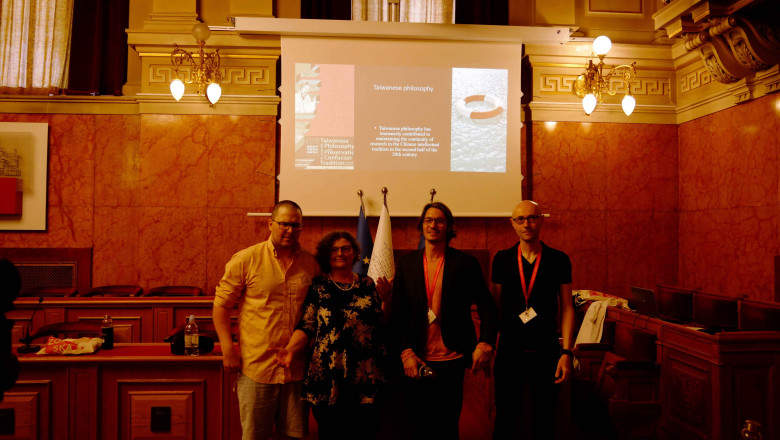

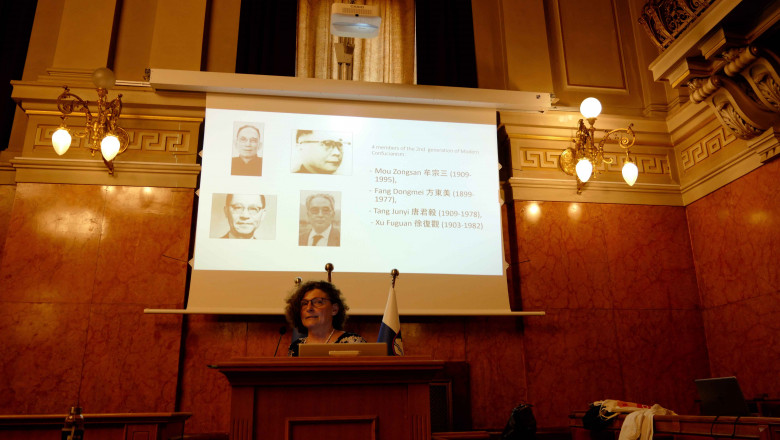
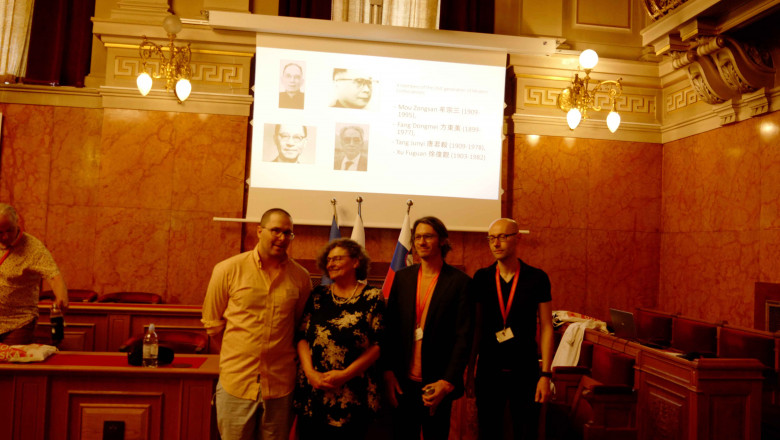
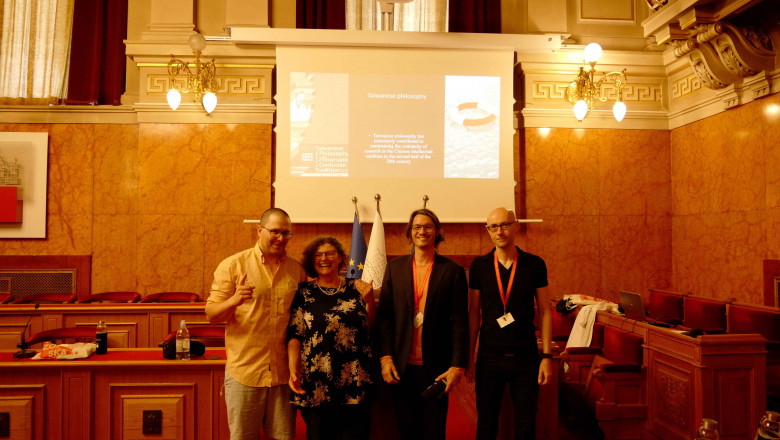
March 4, 2021, The event is part of the Virtual Symposium "Conversations on Chinese Philosophy", organized by the University of Naples "L'Orientale" and Tallinn University.
Video below.
Date: March 4, 2021 at 11:30 CET
Microsoft Teams
Register here.
Participants:
Professor Jana S. Rošker, University of Ljubljana, Slovenia
Professor Lee Ming-huei, Academia Sinica, Taipei, Taiwan
Professor Fabian Heubel, Academia Sinica, Taipei, Taiwan
Professor Huang Kuan-min, Academia Sinica, Taipei, Taiwan
Assistant Professor Wu Hui-ling, Fu Jen Catholic University, New Taipei City, Taiwan
The participants will discuss about the role, function and significance of modern and contemporary Taiwanese philosophy and its contributions to the further development of Chinese philosophy, especially during the second half of the 20th century.
While the Chinese conceptual tradition (especially Confucianism) fell out of favour from the 1950s onwards and was often banned or at least severely criticized on the mainland, Taiwanese philosophers constantly strove to preserve and develop it. Many of them tried to modernize their own traditions through dialogs with Western thought, especially with the ideas of the European Enlightenment. However, it was not only about preserving tradition; in the second half of the 20th century, several complex and coherent philosophical systems emerged in Taiwan. The creation of these discourses is evidence of the great creativity and innovative power of many Taiwanese theorists, whose work is still largely unknown in the Western world.
They will also introduce the results of the research project Modern and Contemporary Taiwanese Philosophy (RG004-U-17), which is supported by the Taiwanese Chiang Ching-kuo Foundation for international scholarly exchange. In this context, they will introduce two publications:
A special issue on Taiwanese philosophy of the academic journal Asian Studies published in September 2020 at the University of Ljubljana.
An edited volume entitled Modern and Contemporary Taiwanese Philosophy: Traditional Foundations and New Developments, published in January 2021 at the Cambridge Scholars Publishing.
Round table on Taiwanese philosophy
November 15-19, 2019: Jana Rošker's participation at the International conference in Honour of the 2570th Anniversary of Confucius and Sixth Congress of the International Confucian Association in Beijing
From November 15, until November 19, 2019, the project director Jana Rošker was invited to participate at the International conference in Honour of the 2570th Anniversary of Confucius and Sixth Congress of the International Confucian Association in Beijing.
On this conference, she has delivered a plenary speech at the opening ceremony on November 15, 2019. In this speech, she has presented the importance of the Taiwanese Modern Confucians, especially Mou Zongsan and Xu Fuguan, to the preservation of the Confucian philosophical tradition through the lens of the question about the religious and philosophical dimensions of Confucianism.
Her plenary speech was entitled "Is Confucianism a Religion? Modern Confucian Theories on the Ethical Nature of Classical Discourses."
On November 18, the project director also delivered an additional presentation on Xu Fuguan’s concept of concerned consciousness and its importance for the consolidation of the specific features of Confucian philosophy and society.
Picture 1: There were over 500 scholars in the audience, listening to Professor Jana S. Rošker’s speech
Picture 2: During the presentation of the plenary speech
Picture 3: After the successful presentation of the plenary speech - debate
Picture 4: Presenting the main features of Xu Fuguan’s theory
September 5-7, 2019: 3rd International Conference of the European Association of Chinese Philosophy (EACP)
The project team members have organized and carried out a round table on Taiwanese philosophy at the 3rd International Conference of the European Association of Chinese Philosophy (EACP), which took place at the Ghent University in Belgium.
The title of the round table was: Philosophy in Taiwan and Taiwanese Philosophy.
Speakers (in alphabetical order):
- Bart Dessein, Ghent Unviersity (e-mail: Bart.Dessein@UGent.be)
- Lee Hsien-Chung, National Taiwan University (e-mail: hclee@ntu.edu.tw )
- Lin Ming-chao, National Taiwan University (e-mail: mingchao@ntu.edu.tw)
- Jana Rošker, Ljubljana University (e-mail: jana.rosker@ff.uni-lj.si)
- Téa Sernelj, Ljubljana University (e-mail: tea.sernelj@ff.uni-lj.si)
- Wu Hui-ling, Fu-jen Catolic University (e-mail: huiling0120@gmail.com)
Description:
The main goal of the round table was to introduce to the European philosophic circles and the most important achievements of modern and contemporary Taiwanese philosophers, along with their contributions in the field of contemporary philosophical theory. There are two main reasons for the immense importance of Taiwanese philosophy for East Asia and the contemporary academic world: 1. First, they can be found in its contributions to the preservation of traditional Chinese thought during the latter half of the 20th century. 2. Secondly, its development of specific innovative philosophical approaches and systems have been since this period profoundly influencing the theoretical discourses in the entire East Asian region. The philosophical currents in modern Taiwan were mainly developed during the second half of the 20th Century, in which the philosophical theory in mainland China was largely limited to the Sinification of Marxist thought. Hence, for many decades, Taiwanese philosophy was the only driving force behind the development, modernization, and upgrading of traditional Chinese thought and its syntheses with Western philosophy. Therefore, it soon also gained a wide spread popularity in most of the other East Asian societies that were traditionally influenced by classical Chinese thought, such as Japan and South Korea. Besides investigating Taiwanese influences upon these East Asian regions, the debate also aims to focus upon the broad and important impact of Taiwanese philosophy to the mainland Chinese academic world.
Each of the speakers has introduced and discussed a particular aspect of Taiwanese philosophy. The debate has focused upon questions related to the following aspects of Taiwanese philosophy:
- development of the methodology of Chinese philosophy in Taiwan,
- Buddhist studies and Buddhist policies,
- Daoist philosophy,
- Modern Confucianism,
- Aesthetic thought, and
- Intercultural dialogues.
Due to sudden illness, Professor Lin Ming-Chao from the National Taiwan University was eventually not able to attend the conference and to participate at the round table. However, his abstract was still included into the conference program and discussed by the other participants.
Abstracts of individual speakers' presentations: here
Slika 1: Discussion. Speaking: Assistant Professor Wu Hui-Ling, Fu-Jen University, Taipei
Slika 2: Discussion. Speaking: Professor Lee Hsien-Chung, National Taiwan University
Slika 3: Professor Jana S. Rošker (Ljubljana University) announcing the speech of Professor Li Hsien-Chung (National Taiwan Unviersity)
Slika 4: Speech by Assistant Professor Téa Sernelj, University of Ljubljana
Slika 5: Speech by Professor Jana S. Rošker, University of Ljubljana
July 2-5, 2019: attendance at the 21st ISCP (International Society of Chinese Philosophy) Conference on Chinese Philosophy, Berne, Swiss.
From July 2nd until July 5th 2019, the project director Professor Jana S. Rošker and the project team member Assoc. Professor Téa Sernelj, have attended the 21st ISCP (International Society of Chinese Philosophy) Conference on Chinese Philosophy, which took place in Berne, Swiss.
Here is the link to the conference program and the list of papers and presenters: http://iscp2019.philo.unibe.ch/index.php/schedule-list-of-papers/
Associate Professor Téa Sernelj has delivered a speech on the important Taiwanese scholar Hsü Fu-kuan (Xu Fuguan) 徐復觀 and his interpretation of the central concepts of Chinese aesthetics, qiyun shengdong 氣韻生動. Her paper was entitled Xu Fuguan’s Interpretation of the Concept Qiyun Shengdong and the Problem of Authenticity. Her presentation was dealing with Xu Fuguan's analysis and interpretation of the concept qiyun shengdong, which he understands as the most essential and fundamental in traditional Chinese aesthetics. Prof. Sernelj exposed that in Xu Fuguan's interpretation, shengdong means the actual manifestation of qiyun in the work of art and she pointed out the innovative nature of his aesthetic theory in this segment.
Professor Jana S. Rošker has delivered two speeches.
Firstly, she was invited to participate at the Taiwanese round table which was organized by Associate Professor Lin Ming-chao from the National Taiwan University. Beside Professor Lin and Professor Rošker, the round table also included presentations by Professor Lee Hsien-Chung from the National Taiwan University, and Assistant Professor Wu Huei-ling from the Fu-jen University in Taipei. The title of the round table was中國哲學中的語言、論辯與認知 (The Language, Disputes and Cognition in Chinese Philosophy). In the scope of this round table, Professor Rošker has delivered a speech entitled Modern Confucian Epistemology: From Intuition to Reason – And Back. In this framework she has introduced the epistemic thought of the Taiwanese Modern Confucians Mou Zongsan, Xu Fuguan, and Fang Dongmei.
Secondly, Professor Jana S. Rošker has organized a panel on Modern Confucianism. The panel was entitled Modernization and Westernization in the 20th Century and Beyond: Modern New Confucianism and the Evolvement of Scientific and Moral Knowledge. The participants and the titles of their presentations:
Bart Dessein, Ghent University, Belgium: ‘Confucianism for the Nation’ and ‘Confucianism for the People’: The Heritage of Wang Yangming in Mou Zongsan, and Beyond
Ouyang Xiao, Postdoc Fellow, University College Cork, Ireland: Contemporary Confucianism and Metaphysical Aesthetics.
Jana S. Rošker, University of Ljubljana, Slovenia: Confucian Revivals in Taiwan and Mainland China: Chen Lai’s and Li Zehou’s Upgrading of Mou Zongsan’s Metaphysics of Morality.
Slika 1: Associate Professor Téa Sernelj presenting her paper on Xu Fuguan’s interpretation of the aesthetic concept Qiyun Shengdong.
Slika 2: The participants of the round table with some of the audience. The participants (from right to left): Wu Huei-ling, Fu-jen University, Lin Ming-chao, NTU, Lee Hsien-chung, NTU, Jana S. Rošker, University of Ljubljana.
Slika 3: Professor Jana S. Rošker delivering her speech.
Slika 4: Professor Rošker presenting her paper on the Confucian revivals in Taiwan and mainland China.
Slika 5: Professor Rošker introducing Mou Zongsan’s concept of immanent transcendence (paper on the Confucian revivals in Taiwan and mainland China)
March 15 – 16, 2019: speeches on Taiwanese philosophy at the International PhD workshop
The project director Jana S. Rošker and the project research team members Téa Sernelj and Marko Ogrizek have delivered speeches on Taiwanese philosophy at the International PhD workshop in Korte.
In her contribution entitled Frameworks of reference in Asian studies: Taiwan, Mainland China and Japan, Jana S. Rošker has introduced the important role of the Taiwanese discourses upon the elaboration of new methodological approaches in the comparative East Asian philosophy.
Téa Sernelj has delivered a speech entitled Modern Confucianism in Taiwan and Japan, in which she has first introduce the relevance of these modern stream of thought that has been in the second half of the 20th century mainly developed in Taiwan. In the second part of her presentation, she has introduced and analysed its influence upon other parts of modern East Asian, especially upon Japan.
Marko Ogrizek’s presentation with the title Japanese Confucianism and the question of de-contextualisation has also focused upon introducing the important role of Taiwanese philosophical methodology for the development of East Asian (particularly Japanese) modern Confucianism. In his lecture, Marko Ogrizek has mainly talked about Huang Chun-chieh’s concept of intercultural de-contextualisation and re-conceptualization, which has played an immensely important role in the process of historical spread of Confucian philosophy from China to other East Asian regions.
December 12, 2018: Lecture at the international workshop at Bonn University
On 16.12.2018, the project director Jana Rošker has delivered an invited plenary lecture at the international workshop at Bonn University. In the lecture, entitled Classical Texts, Modern ideologies – Understanding China through its own Language and Culture, she has pointed out the role and significance of the Taiwanese philosophy in the preservation and development of analyses and interpretations of classical Chinese thought during the second half of the 20. Century, in which philosophy on mainland was limited to the sinisation of Marxist and Leninist theories.
Slika 1: Jana Rošker during the debate after her speech at the Bonn University in Germany
October 14, 2018: Conference at the Politechnical University in Hong Kong
On October 14th, the project director Professor Jana S. Rošker, has attended the conference Social Responsibility and Individual Worth: International Conference on the Modern Implications of Classical Confucianism (社會責任與個體價值:古典儒學的現代啟示國際研討會) at the Hong Kong Polytechnic University. At this conference, she presented a paper on the comparison of mainland Chinese and Taiwanese philosophy in the 20th century. The paper, entitled »牟宗三的內在超越概念與李澤厚的親本體概念的比較« was delivered in Chinese language.
Photo 1: Jana Rošker delivering her paper entitled »牟宗三的內在超越概念與李澤厚的親本體概念的比較«
Photo 2: Jana Rošker participating in the academic debate on Mou Zongsan and Li Zehou together with Roger T. Ames
August 10-20, 2018: The 24th World Congress of Philosophy “BECOMING HUMAN – 學以成人”
The project director Prof. Jana S. Rošker, and the project member Tea Sernelj Ph.D have presented papers on modern Taiwanese philosophy at the XXIV World Congress of Philosophy in Beijing. The congress took place from August 10th till August 20th 2018.
Together with research partners from Taiwan (Professor Lee Hsien-chung, Wu Huiling, Hsio Hung), the project director Jana S. Rošker has organized a round table on the project related topic (The development of the methodology of Chinese philosophy).
The round table is documented in the official national bibliographical database COBISS.SI (see below):
- LEE, Hsien-Chung, ROŠKER, Jana S., HSIAO, Hung-En, CHONG, Chaehyun, WU, Huiling. Methodology of Chinese philosophy: contribution st 24th World Congress of Philosophy, Beijing, 15. 8. 2018. [COBISS.SI-ID 67564386]
The project member Dr. Tea Sernelj has presented her work on the philosophy of the Taiwanese Modern Confucian scholar Xu Fuguan. The contribution is documented in the official national bibliographical database COBISS.SI (see below):
- SERNELJ, Tea. Analysis and critical evaluation of Xu Fuguan's interpretation of the concept qiyun shengdong : prispevek na 24th World Congress of Philosophy, Beijing, 14. 8. 2018. [COBISS.SI-ID 67564642].
Photo 1: The project member Téa Sernelj Ph.D presenting her paper on the philosophical and aesthetic thought of the famous scholar Hsü Fu-kuan (Xu Fuguan)
Photo 2: The organizers of the international round table – project director Professor Jana S. Rošker, the Taiwanese project partners and the Koran participant, Professor Chong Chaehyun.
Photo 3: The organizers of the international round table – project director Professor Jana S. Rošker, the Taiwanese project partners Professor Lee Hsien-chung, Professor Wu Huei-ling, and Professor Hsiao Hung-En.
Photo 4: Project director Professor Jana S. Rošker presents the importance of the Taiwanese contributions to the development of the methodology of Chinese philosophy.
October 17–19, 2019
On October 17–19, 2019, the project team members have organized and hosted an international conference on Taiwanese philosophy at the University in Ljubljana, entitled Taiwanese Philosophy and the Preservation of Confucian Tradition. (see the official website of the conference).
The conference was co-organized and co-funded by the Center for Chinese studies at the National Central Library in Taipei. A small research grant (500 Euro) was also obtained from the EATS (European Association of Taiwanese Studies. But the overall financing was structured in the following way:
65% of the funds were provided by the Center for Chinese studies in Taipei, and 35% were provided by the Ljubljana University and the Slovene National Research Agency (ARRS), mostly in the framework of the research programme group “Asian Languages and Cultures” P6-0243, the head of which is the project director, Professor Jana S. Rošker.
The hosts have covered all costs for the transportation, accommodation and the living expenses for all participants. The invited speakers belonged to the most renewed experts on the conference topic in Taiwan, broader East Asian region, Europe and the USA. They profound and broad expertise has immensely contributed to the overall success of the conference.
The introductory speech of the project director, who was the chief organizer of the conference, can be found here .
The PDF version of the conference booklet containing the full conference program, all events, as well as the abstracts, papers and contact addresses of all participant can be found here.
A report on the conference was also published in the EATS Newsletter (see the PDF attachment entitled “EATS_News_issue_15_31_January_2020”, p. 8-9).
Two publications will result from the conference:
- A selection of the best papers will be published in the special issue of the international academic journal Asian Studies (see https://revije.ff.uni-lj.si/as), the chief editor of which is the project director Jana S. Rošker. The special issue will be published in September 2020 issue (Vol. 8, No 3) of the journal.
- All papers will be republished in an edited volume published by the Center for Chinese studies at the National Central Library in Taipei.
At this opportunity, the National Central Library has donated to the University of Ljubljana over 100 books on Taiwanese philosophy. They were exhibited in front of the conference hall during the duration of the entire conference, and afterwards they were exhibited for two additional weeks at the East Asian Research Library, which was co-founded by the project director, Professor Jana S. Rošker. After the exhibition, the books will become a part of the library of the Department of Asian studies, Faculty of Arts, University of Ljubljana.
The Newsletter of the European Association of Taiwan Studies
The book exhibition
The announcement and the speakers podium
The book exhibition
Opening speech delivered by the project director, Professor Jana S. Rošker
Opening speech delivered by the director general of the National Central Library in Taipei
Opening speech delivered by Professor Zlatko Šabič, director general of the East Asian Resource Library (EARL)
Welcome remarks by Professor Roman Kuhar, Dean of the Faculty of Arts at the University of Ljubljana
Welcome remarks by Professor Monika Kalin – Golob, Dean of the Faculty of Social Sciences at the University of Ljubljana
The keynote speaker, Professor Huang Kuan-Min from the Academia Sinica in Taipei
A group photo of all participants
The audience and the conference venue (Photo 1)
The audience and the conference venue (Photo 2)
The audience and the conference venue (Photo 3)
The audience and the conference venue (Photo 4)
The audience and the conference venue (Photo 5)
Guest lectures
On 25 June 2022, the project leader, Professor Jana S. Rošker has delivered an invited guest lecture at the Sorbonne University in France. The lecture was entitled " Li Zehou and the Modern New Confucianism: the Sinophone Confucian revival in Taiwan and the U.S ". The lecture was hybrid, which means that most of the audience has attended it online, but some students have also attended it in person, The lecture focused on a comparison between two important discourses that have shaped the development of modern Sinophone philosophy and the role of Confucian revival within its scope. It offered a contrastive analysis of Li Zehou’s Anthropo-Historical Ontology on the one, and Taiwanese Modern New Confucian philosophy on the other side.
On 18 October 2021, the project leader, Professor Jana S. Rošker has delivered an invited guest lecture at the University of Salzburg. The lecture was entitled "COVID -19 and traditional Chinese philosophy". It focused on the philosophy of life of the Taiwanese philosopher Fang Dongmei (1899-1977); the speaker has introduced his important work in the development of traditional Confucian philosophy and pointed out its significance in today's world. In this context, she particularly highlighted its role in the evolvement of new models of social cooperation and solidarity, which are an important element of current and future pandemic solution strategies.

Online guest lecture on the comparisson of Li Zehou and the Taiwanese Modern Confucianism at the Summer School at the Department of Philosophy, Beijing Normal University.
Jana S. Rošker: Li Zehou and Modern New Confucianism
In order to to introduce the dialectic of the most prominent representative of the Taiwanese Modern Confucianism, and to embed his work into a broader East Asian context, the project director Jana S. Rošker has delivered two invited guest lectures on the comparative analysis between the Japanese philosopher Nishida Kitaro and the Taiwanese philosopher Mou Zongsan on April 3 and March 28, 2019 (see below):
April 3, 2019
The lecture was delivered at the EARL (East Asian Resource Library) at the Faculty of Social Sciences in Ljubljana on April 3, 2019. It was entitled Teoretska izhodišča vzhodnoazijske modernizacije in filozofski dialogi med Tajvanom in Japonsko: primerjava dialektičnega modela Nishide Kitaroja in Mou Zongsana (The Theoretical Bases of East Asian Modernization and the Philosophical Dialogues between Taiwan and Japan: a Comparison of the Dialectical Models Nishida Kitaro’s and Mou Zongsan’s).
The announcement can also be found here.
Here is a short summary of the lecture:
Nishida Kitaro and Mou Zongsan belong to the most important East Asian philosophers of the 20th century. Based on the introduction of the most important characteristics of the specific referential frameworks defining East Asian philosophical theories, the lecture offers a contrasting analysis of their particular dialectical models. Despite the manifold differences between them, a comparison between these two models of “practical dialectics” is fruitful, for it points to an important method offered by new approaches rooted in the so-called philosophy of sublation. Although it does not lead to a genuine “unity of oppositions”, it points to the manifold possibilities of creating different models of dialectical thought as such. In this sense, it comprises a shift of perspective, based upon a sublation of previous modes of perception. Such alternations of horizons that go beyond the common views of the laws and paths of reasoning are always a precious tool of philosophical thought, because they not only point to additional, different methods of perceiving and interpreting our complex reality, but also represent an indispensable precondition of any philosophical innovations.
Jana S. Rošker with the announcement of the invited guest lecture.
Jana S. Rošker during the lecture
Jana S. Rošker with Professor Zlatko Šabič, the Director General of the EARL
During the discussion
March 28, 2019
Jana S. Rošker has delivered an invited guest lecture at the Department of Philosophy at the Vienna University. The lecture was entitled Gegensatz und Widerspruch im Spiegel der Komparativen Philosophie: Ein Vergleich der dialektischen Modelle Nishida Kitarōs und Mou Zongsans (Opposition and Contradiction: a Comparison between the Dialectical Models Nishida’s Kitaro and Mou Zongsan’s).
See the attached invitation. The lecture announcement can also be found here.
Almost one hundred people have attended the lecture.
Lecture description:
Against the background of a general reflection on the central methodological problems faced by all researchers in comparative transcultural philosophy, this presentation has first addressed some problems linked to the incommensurability of different culturally conditioned philosophical frameworks. On this basis, Professor Rošker has exposed the importance of modern Taiwanese philosophical discourses for the development of new theoretical models.
Then, she has briefly outlined the specificities of the general traditional Chinese referential framework which has been – inter alia - created in Taiwan and which has significantly influenced most East Asian philosophies. These differences have then been concretely treated through the optics of the concept of nonbeing or absence (wu, mu 無) and the self-negation of the moral self, based on philosophical essays by two theoreticians who are among the most important and influential East Asian philosophers of the 20th century. These are the founder of the Japanese Kyoto school Nishida Kitaro (1870-1945) on the one hand, and the main representative of the 2nd generation of Taiwanese Modern Confucianism, Mou Zongsan (1909-1995) on the other.
Based on the differences between the referential frameworks of the prevailing streams in the European and the East Asian philosophies respectively, the lecture has first briefly introduced the main features defining two concrete modern East Asian systems of dialectical development. These are Nishida Kitaro’s model of Basho dialectics on the one hand, and Mou Zongsan’s model of the self-negation of the moral self on the other. In the next step, the lecturer has briefly analysed these two dialectical models by means of a contrastive comparison. In conclusion, the lecture has shown that a comparison between these two models of “practical dialectics” is fruitful: although it does not lead to a genuine “unity of oppositions”, it points to the manifold possibilities of creating different models of dialectical thought as such. In this sense, it comprises a shift of perspective, based upon a sublation of previous modes of perception. Such alternations of horizons that go beyond the common views of the laws and paths of reasoning are always a precious tool of philosophical reasoning, because they not only point to additional, different methods of perceiving and interpreting our complex reality, but also represent an indispensable precondition of any philosophical innovations or new insights.
March 14, 2019
On Thursday, March 14, Professor Jana S. Rošker has delivered a special guest lecture at the Faculty for Social Studies in Ljubljana.
The lecture, entitled “The Intercultural Dimensions of Confucianism: Taiwanese Studies of Dasan Jeong Yakyong (茶山丁若鏞)” took place in the framework of the Days of Korean Studies 2019.
In her lecture, Professor Rošker has exposed the important role and essential function of Taiwanese scholars from the field of philosophy and intellectual history in the research on Korean Confucianism. Their academic support in the revival of Korean Confucianism is crucial for the awareness of the Korean contribution to the Confucian studies at the international level.
Info about the event: here.
The audience – students of Korean Studies and students of International Relations at the Faculty of Social Studies.
The beginning of the lecture – explaining the title
Explaining the general importance of Taiwanese philosophy for the revival of Korean Confucianism
Introducing the Taiwanese scholar Lee Ming-Huei and his important research in the Korean Confucian philosopher Han Wonjin
Introducing the Taiwanese Confucian scholar Huang Chun-Chieh and his methodology of East Asian intercultural Confucian studies
November 8, 2018
On November 8th 2018, the project director Professor Jana S. Rošker has delivered a public lecture on Neo-Confucian philosophy in the National Museum of Slovenia. In the lecture, she focused upon the Taiwanese Modern Confucian analyses of the Song Dynasty philosopher Wang Yang–Ming, particularly exposing the importance of Mou Tsung-San’s late work and Tu Wei-ming’s studies on this topic.
For more information on the lecture see here.
December 6, 2018
On December 6th 2018, the project member Téa Sernelj PhD has delivered a public lecture on Traditional Chinese Aesthetics through the lens of Xu Fuguan’s analyses in the National Museum of Slovenia. She pointed out that the modern Taiwanese scholar Xu Fuguan belongs to the earliest pioneers who have established Chinese aesthetics as an independent, specific philosophical discipline.
More about the lecture: National Museum of Slovenia website
Téa Sernelj PhD’s speaking at the National Museum of Slovenia
November 13, 2018
On November 13th, Jana Rošker has delivered a guest lecture at the Trier University (Germany) entitled “The Sinisation of Marxism and the Preservation of the Confucian Tradition in Taiwan”. The speech was delivered in German language.
October 9, 2018
On October 9th 2018, Jana Rošker has delivered a guest lecture at the Department of Philosophy of the Hong Kong Chinese University. The guest lecture was entitled “New Systems of Chinese Thought in Taiwan and Mainland China: Chen Lai’s and Li Zehou Upgrading of Mou Zongsan’s Moral Metaphysics” and delivered in English language.
Poster - vabilo na predavanje
Dissemination
On May 25, 2020, the project director Jana Rošker and the project team member Téa Sernelj have published an online presentation of Jana Rošker’s new book entitled “IN THE SHADOW OF GREAT MASTERS: TWO CONTEMPORARY TAIWANESE FEMALE PHILOSOPHERS AND THE QUESTION OF WOMEN IN CHINESE PHILOSOPHY”. For a description of the book, see the section “Publications”.
In the presentation, it is mentioned that the book is part of the CCKF research project on modern and contemporary Taiwanese philosophy.
In the beginning of October 2020, we will also organize a physical public presentation of the same book. The presentation will also be attended by professor Lin Yueh-hui, who is one of the two Taiwanese female philosophers, whose work is described in this book. At this opportunity she will share her professional experiences with a wider Slovenian public in person.
Video >
The project team members have written and performed a musical on philosophical dialogues between East Asia (particularly Taiwan) and Central and Eastern Europe.
The performance was a “dark green” comedy, which highlighted, among other issues, the preservation of traditional Chinese philosophy in Taiwan, and included singing and dancing on a high quality professional level, even though it was mainly performed by teachers and researchers from the Department of Asian Studies at the Ljubljana University. Zhuangzi, who fled to Taiwan, was wondering why the Western philosophers believe that there is no Chinese philosophy, because traditional Chinese thought did not create a concept of subjectivity. Therefore, he decides to visit Central Europe, aiming to find out what this concept actually means. He first visits Prague and talks there with Franz Kafka. Then, he travels to Vienna, where he has debates with Ludwig Wittgenstein and Sigmund Freud. Then, he embarks a train and heads to Venice, where he intends to visit Giordano Bruno. However, on the train, he meets the Slovenian philosopher Slavoj Žižek and Melania Trump, who is also Slovene and visits her relatives in Ljubljana.
After all these encounters Zhuangzi is rather disappointed about the European subject, so he returns home.
The comedy was first performed as a part of the cultural program at the International Conference on Taiwanes Philosophy in October 2019, and three more times afterwards between October 2019 and January 2020.
On February 25, the project member Téa Sernelj was interviewed on Radio Slovenia. In this one hour broadcast, she introduced traditional Chinese aesthetics through the lens of Xu Fuguan’s work. As she has shown in the interview, Xu Fuguan, who belongs to the second generation of Taiwanese Modern Confucians, is a most important figure in the preservation, development and modernization of Chinese and East Asian aesthetic theory.
At the end of the project, i.e. on June 30, 2022, the project director Jana S. Rošker has also organized a public celebration of the successful completion of the project, which included a public presentation of the entire project before international academic audience, and a cultural program. The event has been carried out at the theater hall in the castle of Ljubljana before international scholarly audience on June 30, 2022.
Here are some photos of the cultural program:

